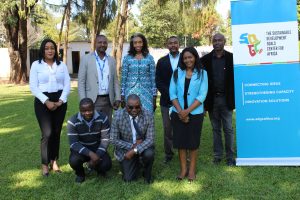
SASSCAL Executive Director Dr Jane Olwoch and Acting Director Dr Abrose Rwaheru Aheisibwe from the Sustainable Development Goals Sub Regional Center for Southern Africa – Lusaka Zambia flanked by their staff members.
The Southern African Science Service Centre for Climate Change and Adaptive Land Management (SASSCAL) resoundingly held a two-day high-level Stakeholder Engagement Meetings in Lusaka, Zambia from the 20th to the 21st of May 2021. The purpose of this high-level engagements was to shed light and to report on SASSCAL’s progress on its projects and milestones.
As a precursor to the SASSCAL Donor Conference to be held in November 2021 and as an endeavour to increase SASSCAL visibility in the Southern African and attract more donors , the Executive Director Dr Jane Olwoch led a delegation to Zambia.
One of the most significant engagements, the SASSCAL delegation had during the Zambia Stakeholder Meeting was the high-level discussion held with the Permanent Secretary (PS) of Ministry of Higher Education in her capacity as representative of the Minister of Higher Education. The PS affirmed Zambia’s full support for SASSCAL and its bold steps towards the completion of the Ratification of SASSCAL Treaty are in advance stage.
SASSCAL is a joint initiative of six member states namely Angola, Botswana, Namibia, South Africa, Zambia and Germany, established for the purposes of promoting science for sustainable development as well as scientific response to challenges of global change.
The broader stakeholder meetings was attended by SASSCAL Board Chair Mrs Jane Chinkusu and senior delegates from various Zambian stakeholder institutions.
In her remarks, the Board Chair, giving the historical background of SASSCAL and its future direction, pointed out that SASSCAL is intensifying its commitments to fight and mitigate the effects of climate change in the region. This, the institution will be able to achieve by development of robust strategies and plans for the future. She also emphasised the importance of collaboration among stakeholders across the board as well as research oriented solutions and innovations in achieving the climate management goals.
Mrs Chinkusu, hailed Zambia’s efforts for being an active participant in SASSCAL, 1.0 Programme, with its flagship seen in meteorological improvements. She says that while SASSCAL’s is on the advanced stage to move to SASSCAL 2.0 which is another impactful flagship programme, much advantage and developmental opportunities will be open since the organisation is set to be elevated to international status.
Dr. Jane Olwoch, SASSCAL Executive Director also commended Zambia as a great champion for SASSCAL as shown in the number of research scientists and the support that the country has given to SASSCAL. She further informed the stakeholders that SASSCAL has moved a step further to not only managing research but to also producing services and products. She says that “SASSCAL has produced good products in terms of books, passports and projects that have transformed livelihoods such as crop efficiency, biodiversity observation sites, water projects and capacity building.
There was a constructive and informative dialogue during the two days of the workshop and other added engagements. The stakeholders recommended the following measures to be taken in collaboration with SASSCAL;
- From the science products which have been developed there will be a need to go a step further to develop applications/decision support tools.
- There is also need for expansion of the Network of the automatic weather stations
- A technical workshop will be recommended with focus on topics from SASSCAL 1.0 which can be scaled up to products and services.
SASCAL continues to invest into knowledge and capacity development as part of its operational goals. This is done through incorporation of learning and research programmes into local universities as well as access to German Universities at Masters and PHD Level.
The Board Chair thanked everyone on behalf of the Zambian Ministry of Higher Education and encouraged the stakeholders to make information available as there are a lot of opportunities out there. She also encouraged stakeholders to strategise on communication aspects. She further highlighted that scientists are ready to go into phase 2 of SASSCAL research. She encouraged the researchers who did not make it for proposal selection to come up with other programs which can later be proposed for funding.
In her closing remarks Executive Director thanked stakeholders for an interactive and interesting session and for their openness. She encouraged everyone to stay connected, form strong groups and share ideas as there was a lot of funding opportunities for science.
The Executive Director Dr Jane Olwoch and the SASSCAL delegation also paid courtesy visit to the Southern Africa Sustainable Development Goals (SDG) Centre in Zambia to deliberate on areas of collaboration regarding the UN-SDG’s with a particular focus on SDG 13 Climate Action, 7 Affordable Clean Energy and 17 partnership for the goals.




